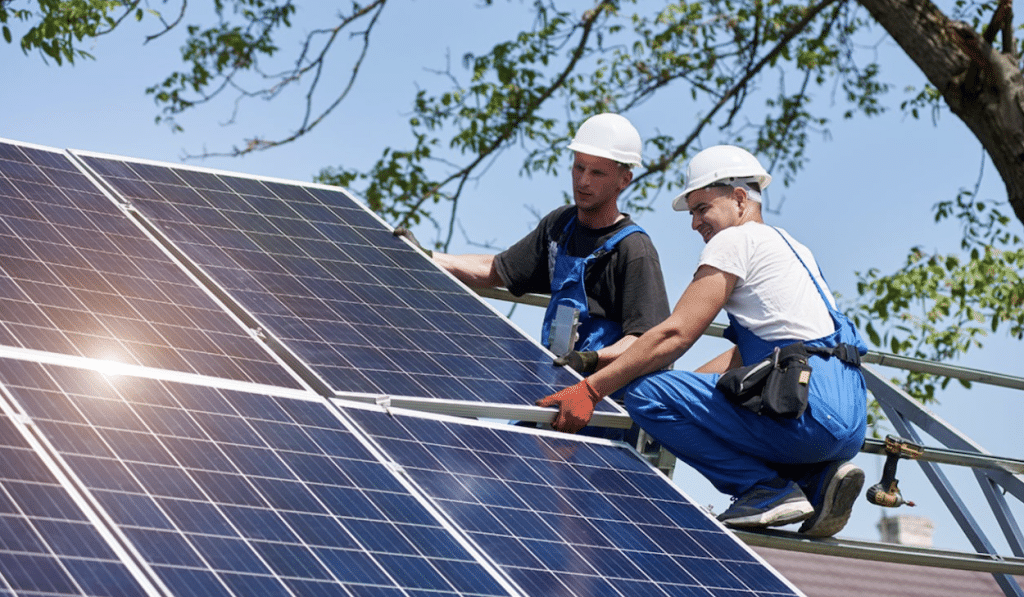The agriculture sector stands at a critical juncture where the need for sustainable practices is becoming increasingly imperative in the face of water scarcity, climate change, and growing global food demands. Traditional farming methods, heavily reliant on non-renewable resources and inefficient water usage, are no longer viable. In this context, solar-powered irrigation systems emerge as a beacon of innovation, offering a sustainable solution by harnessing renewable energy for water management. This article delves into how these systems reduce the agriculture sector’s carbon footprint, enhance efficiency, and support farming in the world’s most remote and arid regions.
The Basics of Solar-Powered Irrigation Systems
Solar-powered irrigation systems are a sophisticated blend of technology and renewable energy designed to optimize water usage and reduce dependency on traditional power sources. At their core, these systems utilize solar panels to capture sunlight, converting it into electrical energy to power water pumps. This seamless integration of solar panels, pumps, and distribution systems facilitates a more efficient irrigation process, marking a significant shift from conventional diesel-powered and grid-dependent systems.
Advantages of Solar-Powered Irrigation
Amidst these advantages, energy efficiency and cost savings stand out as particularly transformative benefits for the agricultural sector. They highlight the dual economic and environmental value that solar-powered irrigation systems bring to farmers and communities worldwide.
Energy Efficiency and Cost Savings
The transition to solar irrigation represents a paradigm shift in agricultural energy use, promising substantial cost savings and efficiency gains. By eliminating the need for grid electricity or diesel, farms can significantly reduce their operational costs and dependency on fluctuating fuel prices. The initial investment in solar technology pays off long-term, making it a financially viable option for farmers worldwide.
Sustainability and Environmental Impact
Solar-powered irrigation stands out for its minimal environmental footprint, contributing significantly to the agricultural sector’s sustainability goals. These systems drastically reduce greenhouse gas emissions associated with traditional irrigation methods by utilizing clean energy and aligning farming practices with global environmental conservation efforts.
Enhanced Water Management
Precision in water management is another hallmark of solar-powered irrigation systems. These systems are equipped with advanced monitoring and control technologies that ensure water is used judiciously, reducing wastage and supporting conservation efforts. This level of precision is crucial in regions facing water scarcity, making sustainable agriculture more attainable.
Rugged Technology in Solar-Powered Irrigation
The seamless integration of rugged technology into solar-powered irrigation systems ensures their reliability and durability. Before delving deeper into the specifics, it’s essential to understand what rugged technology entails and its critical importance in the agricultural setting.
What Is Rugged Technology
In the agricultural context, technology’s reliability is paramount, especially when deployed in outdoor settings subject to harsh environmental conditions. Rugged technology designed to endure extreme weather, dust, and moisture plays a crucial role in the durability and operational continuity of solar-powered irrigation systems.
Durability and Weather Resistance
Rugged computers and devices are built to withstand the rigors of outdoor agricultural environments. Their construction, using durable materials and weather-resistant designs, ensures they remain functional in extreme conditions, from scorching heat to torrential rains, making them indispensable in remote and arid farming regions.
Role in Solar-Powered Irrigation
Integrating rugged technology guarantees that solar-powered irrigation systems remain resilient and maintain performance over time. This durability is essential for ensuring that the systems’ sophisticated components, such as sensors and control units, operate flawlessly, providing consistent water supply and system monitoring without interruption.
Implementation in Remote and Arid Regions
Challenges in these areas are manifold, ranging from limited access to water to the absence of reliable energy sources. Solar-powered irrigation systems offer a lifeline, enabling efficient water use and cultivation on previously barren lands. Success stories from around the globe underscore the transformative potential of these systems, bringing economic and social benefits to remote communities.
Future of Solar-Powered Irrigation in Agriculture
Innovation continues to drive the evolution of solar-powered irrigation, with emerging technologies poised to enhance system efficiency and functionality further. However, scaling these solutions and overcoming adoption barriers remains a challenge. Supportive policies, incentives, and educational efforts are essential to accelerate the widespread adoption of this sustainable irrigation method.
Integrating solar-powered irrigation systems marks a significant advance in the quest for sustainable agriculture. Coupled with rugged technology, these systems offer a resilient and efficient solution to water management challenges and energy use in farming. As we move forward, the potential of solar-powered irrigation to revolutionize agricultural practices is undeniable, promising a future where sustainability and productivity go hand in hand.
